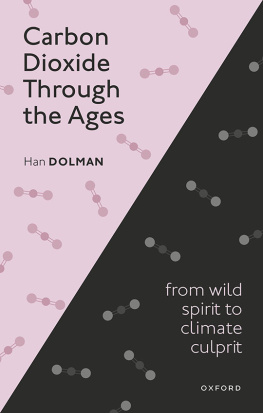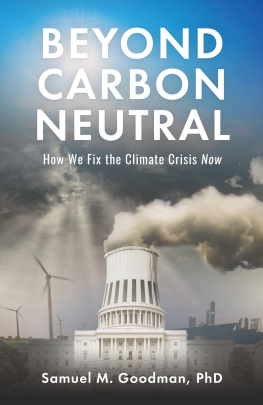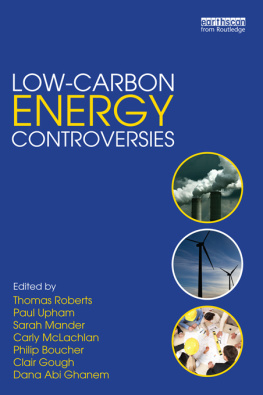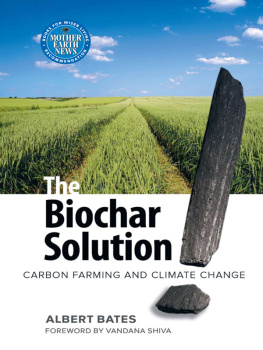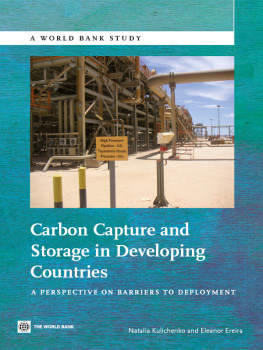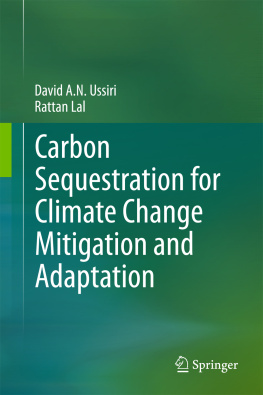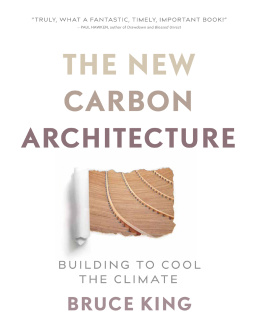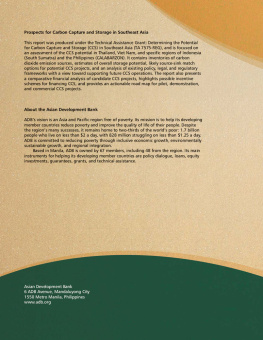Herzog - Carbon Capture
Here you can read online Herzog - Carbon Capture full text of the book (entire story) in english for free. Download pdf and epub, get meaning, cover and reviews about this ebook. City: Cambridge;Massachusetts, year: 2018, publisher: The MIT Press, genre: Romance novel. Description of the work, (preface) as well as reviews are available. Best literature library LitArk.com created for fans of good reading and offers a wide selection of genres:
Romance novel
Science fiction
Adventure
Detective
Science
History
Home and family
Prose
Art
Politics
Computer
Non-fiction
Religion
Business
Children
Humor
Choose a favorite category and find really read worthwhile books. Enjoy immersion in the world of imagination, feel the emotions of the characters or learn something new for yourself, make an fascinating discovery.

- Book:Carbon Capture
- Author:
- Publisher:The MIT Press
- Genre:
- Year:2018
- City:Cambridge;Massachusetts
- Rating:4 / 5
- Favourites:Add to favourites
- Your mark:
- 80
- 1
- 2
- 3
- 4
- 5
Carbon Capture: summary, description and annotation
We offer to read an annotation, description, summary or preface (depends on what the author of the book "Carbon Capture" wrote himself). If you haven't found the necessary information about the book — write in the comments, we will try to find it.
Carbon Capture — read online for free the complete book (whole text) full work
Below is the text of the book, divided by pages. System saving the place of the last page read, allows you to conveniently read the book "Carbon Capture" online for free, without having to search again every time where you left off. Put a bookmark, and you can go to the page where you finished reading at any time.
Font size:
Interval:
Bookmark:
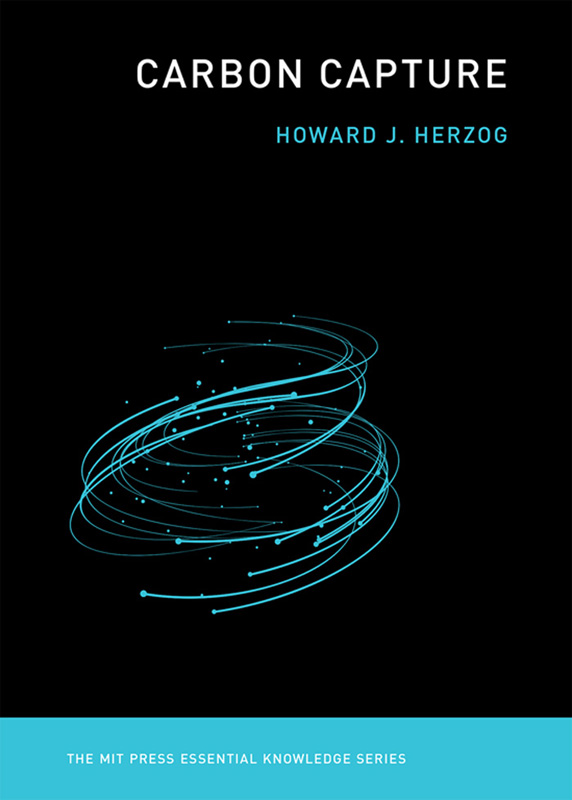
The MIT Press Essential Knowledge Series
Auctions, Timothy P. Hubbard and Harry J. Paarsch
The Book, Amaranth Borsuk
Carbon Capture, Howard J. Herzog
Cloud Computing, Nayan Ruparelia
Computing: A Concise History, Paul E. Ceruzzi
The Conscious Mind, Zoltan L. Torey
Crowdsourcing, Daren C. Brabham
Data Science, John D. Kelleher and Brendan Tierney
Extremism, J. M. Berger
Free Will, Mark Balaguer
The Future, Nick Montfort
Information and Society, Michael Buckland
Information and the Modern Corporation, James W. Cortada
Intellectual Property Strategy, John Palfrey
The Internet of Things, Samuel Greengard
Machine Learning: The New AI, Ethem Alpaydin
Machine Translation, Thierry Poibeau
Memes in Digital Culture, Limor Shifman
Metadata, Jeffrey Pomerantz
The MindBody Problem, Jonathan Westphal
MOOCs, Jonathan Haber
Neuroplasticity, Moheb Costandi
Open Access, Peter Suber
Paradox, Margaret Cuonzo
Post-Truth, Lee McIntyre
Robots, John Jordan
Self-Tracking, Gina Neff and Dawn Nafus
Sustainability, Kent E. Portney
Synesthesia, Richard E. Cytowic
The Technological Singularity, Murray Shanahan
Understanding Beliefs, Nils J. Nilsson
Waves, Frederic Raichlen
2018 Massachusetts Institute of Technology
All rights reserved. No part of this book may be reproduced in any form by any electronic or mechanical means (including photocopying, recording, or information storage and retrieval) without permission in writing from the publisher.
This book was set in Chaparral Pro by Toppan Best-set Premedia Limited. Printed and bound in the United States of America.
Library of Congress Cataloging-in-Publication Data
Names: Herzog, Howard J., author.
Title: Carbon capture / Howard J. Herzog.
Description: Cambridge, MA : The MIT Press, [2018] | Series: The MIT press
essential knowledge series | Includes bibliographical references and index.
Identifiers: LCCN 2018003170 | ISBN 9780262535755 (pbk. : alk. paper)
eISBN 9780262348850
Subjects: LCSH: Carbon dioxide mitigation. | Carbon sequestration. | Climate change mitigation.
Classification: LCC TD885.5.C3 H47 2018 | DDC 628.5/32--dc23 LC record available at https://lccn.loc.gov/2018003170
ePub Version 1.0
I dedicate this book to my grandchildren, Jonah and Sophie and those yet to be born. Your generation will be on the front lines of climate change. I hope that we bequeath you the wisdom and technology to deal with it.
Series Foreword
The MIT Press Essential Knowledge series offers accessible, concise, beautifully produced pocket-size books on topics of current interest. Written by leading thinkers, the books in this series deliver expert overviews of subjects that range from the cultural and the historical to the scientific and the technical.
In todays era of instant information gratification, we have ready access to opinions, rationalizations, and superficial descriptions. Much harder to come by is the foundational knowledge that informs a principled understanding of the world. Essential Knowledge books fill that need. Synthesizing specialized subject matter for nonspecialists and engaging critical topics through fundamentals, each of these compact volumes offers readers a point of access to complex ideas.
Bruce Tidor
Professor of Biological Engineering and Computer Science
Massachusetts Institute of Technology
I would like to thank the MIT Press, for giving me the opportunity to write this book, and my editor, Beth Clevenger, for all her advice and encouragement. In addition, I would like to those who read parts or all of this book and gave me helpful feedback: Emre Gencer (MIT), Deborah Herzog (my wife), Susan Hovorka (University of Texas at Austin), Henry [Jake] Jacoby (MIT), Monica Lupion (MIT), Niall Mac Dowell (Imperial College, London), Granger Morgan (Carnegie Mellon), Norman Oppenheim (friend), Sergey Paltsev (MIT), David Reiner (University of Cambridge), and Ed Rubin (Carnegie Mellon). Finally, I would like to thank the many sponsors of my research into carbon capture over the past twenty-eight years, the dozens of students who have worked with me, and the hundreds of colleagues from around the world that I have had the pleasure to work with. I very much appreciate your role in helping me acquire my expertise in carbon capture.
Introduction
Mark Twain famously quipped, Everybody talks about the weather but nobody does anything about it. Now, in the twenty-first century, everyone still talks about the weather, but more and more people are talking about climate and the ways in which it is changing, with many people trying to do something about it. This book is about one option to do something about the changing climate: carbon dioxide capture and storage (CCS), or carbon capture for short. (In this book, I will use the terms carbon capture and CCS interchangeably.)
The burning of fossil fuels, namely coal, oil, and natural gas, releases carbon in the form of carbon dioxide (CO2). The CO2 then becomes part of the exhaust gases that go up the smokestacks of our power plants and factories, out of the tailpipes of our automobiles, and up the chimneys of our homes. These CO2 emissions are a major driver of climate change. The idea behind CCS is to capture the CO2 before it is released to the atmosphere. Capture technology exists today, with its roots in industrial processes that cleaned up gaseous products by removing acid gases like CO2 and SO2. The question then arises: What to do with the CO2? There are some opportunities for using it, but they are limited. As a result, most current CCS strategies call for the injection of CO2 deep underground. This forms a closed loop, where the carbon is extracted from the Earth in the form of fossil fuels and then the carbon is returned to the Earth in the form of CO2. This book will explore and explain the different options for capturing, utilizing, and storing the carbon.
I have been involved in the field of CCS for over a quarter of a century. Over that time, I have conducted research into all of the major aspects of CCS, including capture, storage, utilization, economics, policy, regulation, and public acceptance. However, I am well aware that most people have not even heard of CCS, let alone understand how it works. As part of our research at MIT, we conducted surveys of the public, where we asked the following question about a number of low carbon technologies: Have you heard of or read about any of the following in the past year? We first asked this question in 2003. For carbon capture and storage, only 4 percent of respondents said they had heard or read about it, versus 64 percent for solar energy. By 2012, these numbers had risen to 11 and 72 percent, respectively. Still, almost nine out of ten people are unaware of this major pathway for addressing climate change. For me, this has been a major motivating factor in writing this book: to help people understand what carbon capture is all about.
The first two chapters provide context for carbon capture. Chapter 1 discusses climate change; it explains the problem, outlines the possible solutions, and shows where carbon capture fits in. Chapter 2 looks at fossil fuels, which are central to both the climate change problem and the carbon capture solution. The next three chapters discuss how CCS technologies work, as well as the challenges and opportunities they face. Chapter 3 focuses on capture technology, while chapter 4 discusses what to do with the captured CO2, and chapter 5 reports on the effort to deploy CCS. Up to this point in the book, the source of the captured CO2 has been factories and power plants; chapter 6 looks at trying to capture CO2 from the air. Chapter 7 explores the policies and politics around CCS. The book then concludes by looking into the future and the role that carbon capture can play: chapter 8 shows that the more aggressively we address the climate change problem, the more important the role of carbon capture will become.
Font size:
Interval:
Bookmark:
Similar books «Carbon Capture»
Look at similar books to Carbon Capture. We have selected literature similar in name and meaning in the hope of providing readers with more options to find new, interesting, not yet read works.
Discussion, reviews of the book Carbon Capture and just readers' own opinions. Leave your comments, write what you think about the work, its meaning or the main characters. Specify what exactly you liked and what you didn't like, and why you think so.







